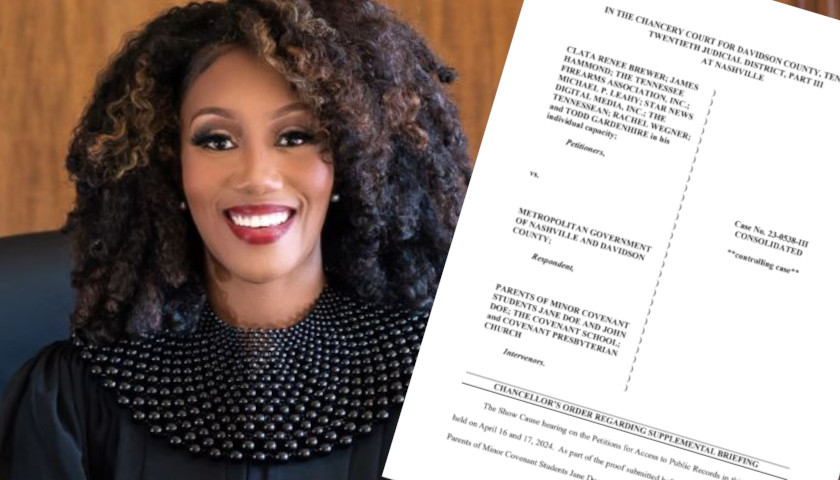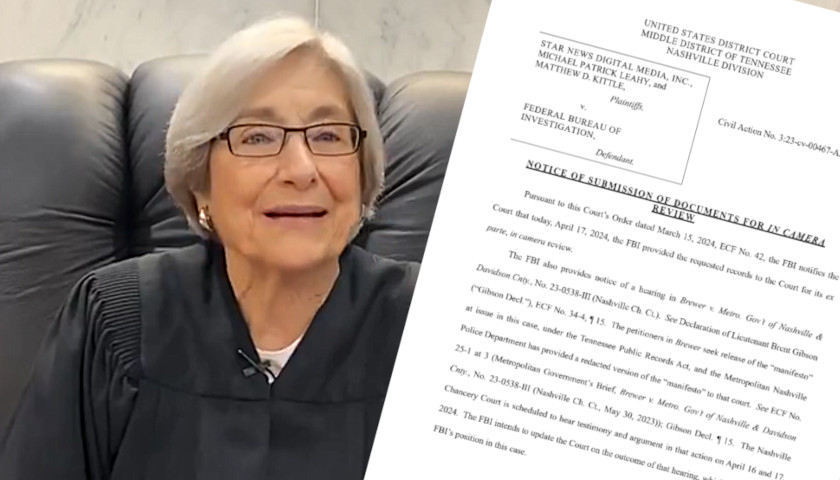Live from Music Row Friday morning on The Tennessee Star Report with Michael Patrick Leahy – broadcast on Nashville’s Talk Radio 98.3 and 1510 WLAC weekdays from 5:00 a.m. to 8:00 a.m. – host Leahy welcomed Southeastern Legal Foundation Director of Litigation and guest all-star panelist, Braden Boucek in studio to discuss wasted resources by the FBI through aggressive enforcement and what it was like working at the Department of Justice under Mueller and Comey.
Leahy: Also, our panelist Braden Boucek director of litigation for the Southeastern Legal Foundation. Braden, you worked at the Department of Justice, and actually, you were Assistant U.S. Attorney. You said you worked very closely with the FBI in a number of cases. Is that right?
Boucek: That’s true. I got to know I had the pleasure of knowing a lot of FBI agents in both Memphis and the Nashville area, and I can’t say enough good things about the professionalism of the FBI.
Leahy: And you told me that the directors there was Robert Mueller and then James Comey. Robert Mueller even commended you for some of your work.
Boucek: Not me personally, but one of my cases he singled out for commendation, I don’t know, in 2007 or 2008 or so.
Leahy: Okay, so here’s the big question. What happened to the FBI? Because now they are running around with guns drawn, intimidating people unnecessarily on obscure law violation allegations.
A couple of cases in point, they go in, the FBI goes into this 40-year-old guy’s house. He’s a pro-life activist who had a little bit of a dust-up on a sidewalk with a cantankerous pro-abortion guy who was intimidating his 12-year-old son. Local folks said, no, nothing to see here.
But then under Merrick Garland, they found this obscure law called the Freedom of Access to Clinic Entrances law. And they used that as a pretext to literally go into the house of this guy in Pennsylvania. He’s got eight kids. They got 30 FBI agents in vests with guns.
They go in at 7:00 a.m. on a Sunday morning, wave the guns around and scare the death out of the kids, arrest the guy. What an abuse of power that looks like to me. What’s happened to these people?
Boucek: Let me be very clear. I don’t think we have a problem with the FBI per se. I think we have a problem with FBI management per se. The rank and file at the FBI are fantastic, great people.
I can’t say enough good things about them. But time and again you keep seeing these decisions in these high profile cases that just raise a lot of flags.
The one you cited is a great example where they came in with heavy aggressive enforcement action against an abortion rights protester under the FACE Act, which probably most Americans didn’t even know was an actual law.
Leahy: I don’t even know this law passed in 1994, and I don’t know if anybody in like 26 years has been prosecuted under this law, maybe one or two. But now, every time you turn around, it’s a FACE Act violation. Here in Tennessee, they’ve just indicted 15 people on this FACE Act, one of whom, by the way, is an 87-year-old woman who’s a survivor of a World War II communist concentration camp in Yugoslavia.
And they sent in these guys with guns to get one of the people here, apparently in Lebanon, Tennessee. He wasn’t home at the time but scared the you-know-what out of his neighbors.
Boucek: There are two questions that you have to ask. Number one is, why are you bothering with this case at all? The most serious allegation that you’ve outlined is that they were obstructing access to an abortion facility.
And I think that there’s an allegation that there might have been shoving and pushing or some kind. If that’s happening, that’s a crime.
But that is what I would have considered a routine misdemeanor assault-style conviction. And that’s the kind of thing that state prosecutions are born to do. Not the might of the full-on FBI.
And then even if you decide that there is something worthy of federal attention here and let me emphasize that it’s not uncommon for federal prosecutors to turn down drug prosecutions because it’s only 100 pounds of marijuana rather than 1,000 pounds, or it’s only a fraud case with a million dollars rather than $5 million.
So how does this one slide into the priorities? There’s also the question, why are you behaving so aggressively with the enforcement action? Federal prosecutors are perfectly able to just indict somebody and have them report themselves in if they’re not an actual threat.
Leahy: And that was the case in Pennsylvania. This guy knew an indictment was coming. This pro-life activist and his attorney contacted the FBI and said, hey, we’ll turn ourselves in.
And they said, no, we’re going to put our jackbooted thugs with their guns and point them at your house with your eight kids instead on a Sunday morning. What’s wrong with that?
Boucek: It’s hard to make sense of why you would opt for that. I mean, it’s not uncommon at all for prosecutors, particularly when they know the defense attorney or working with the defense attorney to work out an arrangement where somebody just surrenders. And it’s safer, frankly, in many cases.
Leahy: It’s got to be dangerous, right? You got 30 FBI agents with guns. Someone will know why they’re knocking on the door. You could see how that could escalate unnecessarily.
Boucek: Yes. And on top of it, it’s also a lot of unnecessary work, right? You’ve got to get a warrant to go through that person’s door, and you’ve got to get all of these teams to execute. It’s just a big waste of resources.
Leahy: So why not just pick up the phone and say, hey, attorney, bring your guy in tomorrow, and we’ll do the paperwork and indict him?
Boucek: And if the guy is not a flight risk and if the guy is not a risk of harming somebody, if you realize you can’t get arrested, that might be an optimal solution. And I don’t know if I can get back to the the case to know why they would have done that. But it does seem strange.
Leahy: Why are they doing it? Are they trying to intimidate normal Americans? Is that the idea?
Boucek: When you see this in conjunction with things like the political targeting of the former president with the Russiagate conspiracy, or when you see it with Merrick Garland’s desire to target America’s parents and label them as domestic terrorists for speaking up at school boards it’s really hard to not see that there’s to suspect that there’s an abuse of power.
Leahy: When you were at the Department of Justice, there were two FBI directors, Robert Mueller, who you think very highly of.
Boucek: I don’t know Director Mueller, but I know that anybody who knew him thought of and spoke very highly of him.
Leahy: The next guy, James Comey, how long was he the FBI director while you were there?
Boucek: I don’t know exactly when he became director relative to my tenure, but I think he was there for roughly half my time at DOJ.
Leahy: And what was the inside skinny on James Comey within the Department of Justice Department, the part where you worked on?
Boucek: He was considered to be a man of extremely high character who stands on principle and would do what was right if he thought it was right. I think that one of the ways to make sense of the way he behaved during the Hillary server scandal was once he became convinced he was right he was willing to do things that raise flags for a lot of Americans of different stripes.
And that includes announcing that he’s going to reopen the investigation or announcing that she’s not going to be indicted but he’s going to wag her finger at her publicly.
Leahy: Let me just stop. (Chuckles) That was bizarre, but you described it exactly right. That press conference just a couple of weeks before the 2016 election and he goes down through this litany of violations of law that she engaged in when she had this private email server, which was a violation of law and all sorts of other violence. It was a long litany of violations. And then he says, but we’re not going to prosecute you. That’s a waving the finger at her.
Listen to today’s show highlights, including this interview:
– – –
Tune in weekdays from 5:00 – 8:00 a.m. to The Tennessee Star Report with Michael Patrick Leahy on Talk Radio 98.3 FM WLAC 1510. Listen online at iHeart Radio.
Photo “Braden Boucek” by Southeastern Legal Foundation. Background Photo “FBI Building” by cisko66. CC BY 3.0.








